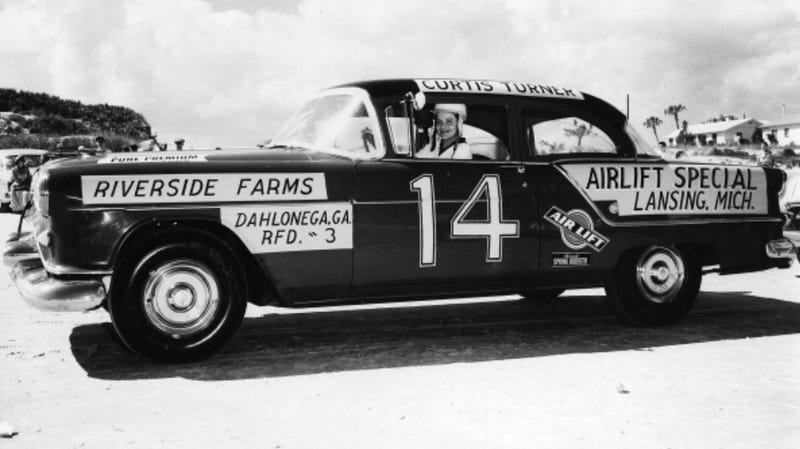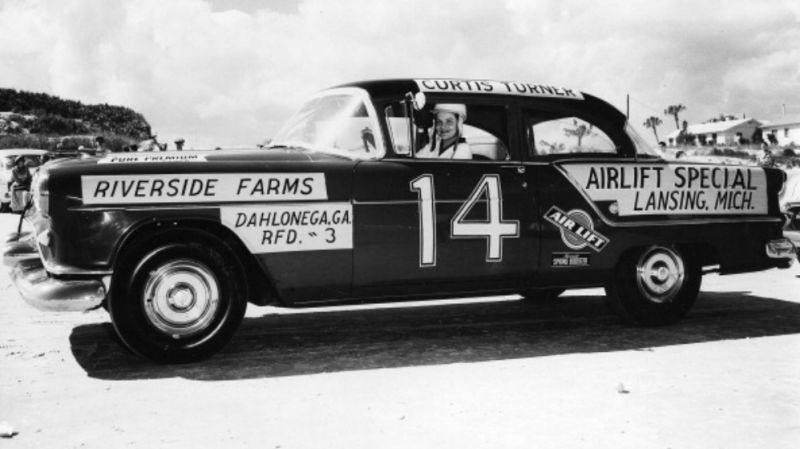
The path to women taking part in sanctioned American racing had to start somewhere. Long before women like Danica Patrick and Jennifer Jo Cobb were getting behind the wheel of stock cars, we had women like Sara Christian setting the stage—and at the first ever NASCAR race to boot.
Like her successor Ethel Mobley, little is known about Christian’s rise through the ranks, aside from the fact that racing was a family affair. Christian married Frank Christian, both a racer and a NASCAR car owner until 1955. She appears to have had some ties to the Flock family as well—all of which are some pretty great ins into the racing world.
It’s uncertain if Christian was racing prior to the official sanctioning of NASCAR (then known as the Strictly Stock series), but it’s likely that she participated in “powder puff derby” events, local events designed solely for women to get behind the wheel (and not to be confused with the Powder Puff Derby air race).
But she must have been putting in results somewhere, because when the Strictly Stock series coalesced, because Christian was there to get behind the wheel for the first ever race at Charlotte Speedway on June 19, 1949. It was as successful an outing as it could have been for her. Christian qualified thirteenth behind the wheel of a Ford owned by her husband—but she was also the one chosen to step out of her car mid-race when Bob Flock’s engine expired early in the race. He took over Christian’s car, only to run it to overheating.
But she must have looked good behind the wheel, because she was back for the series’ second race at the Daytona Beach Road Course a month later—a race which set many records that stand today (or stood for years). Christian’s performance wasn’t unspectacular, given that she clocked an eighteenth place finish.
Advertisement
But in NASCAR’s second race, there were three women competing on the field. Christian lined up next to the likes of Ethel Mobley and Louise Smith to set a pretty incredible record for the era—especially considering that, after a handful of other races in the 1949 NASCAR season, the only other race to feature three women was the 1977 Firecracker 400 that featured Janet Guthrie, Christine Beckers, and Lella Lombardi.
On top of that, Frank Christian entered the race. That made the Christians the only married couple to compete in a NASCAR race until soon-to-be-weds Patty Moise and Elton Sawyer competed against each other on the field in 1986, kicking off a long career of trying to beat one another behind the wheel.
Christian was on a warpath that year. At Langhorne Speedway, she finished a stunning sixth, and race winner Curtis Turner invited her to join him in victory lane to celebrate an incredible landmark for women in racing. She even one-upped herself at Heidelberg Raceway in Pittsburgh, scoring the best-ever and only top five finish by a woman in NASCAR premiership. While Shawna Robinson won the Charlotte-Daytona Dash in 1988, it was a touring car series, not the Monster Energy NASCAR Series equivalent. Christian’s record has been left untouched.
Advertisement
Out of eight events that season, Christian raced in six of them. She finished thirteenth in the points standings at the end of the race and won the United States Drivers Association Woman Driver of the Year award that year to celebrate her accomplishments.
It looked to be a promising career, but it wasn’t meant to be. Christian competed in one single race in 1950, that year’s twelfth race at Hamburg Speedway. She finished fourteenth.
But after that, Christian retired. No one is particularly sure exactly what she did in the years leading up until her death or why she called it quits. Her very short career meant that her stunning breakout success was soon overshadowed by the more colorful Louise Smith.
Advertisement
That said, NASCAR’s series was founded on the families of female drivers who went out with no pretensions, expectations, or formal practice and still proved that they could be pretty damn competitive.















